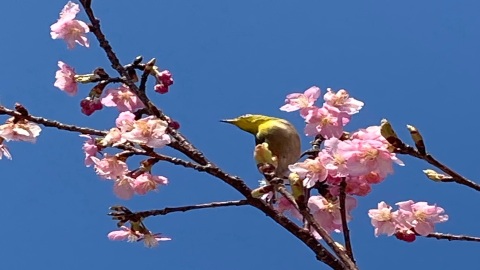バードウォッチャーと歌う鳥
2024.01.16

Bird watchers and singing birds
I’m a fourth year undergraduate student. I’m majoring in ethology, and I have been researching bird songs since this spring. Bird songs are so profound and attractive even only to the extent I can observe. I was lucky to have been informed about a camp that was a social gathering of researchers or and students who are researching birds. It was held by an acquaintance of my supervisor, who specializes in bird songs, so I was also allowed to participate.
The venue was a campsite in a mountain, perfect for bird watching. So early in the morning, we went watching for wild birds. I didn't know much about wild birds, but I was surprised to see that one of the camp participants could identify the species of any birds that caught her eye. Fortunately, all participants had a chance to present their research, and so we were able to hear about everyone's research. There were 20 people and 20 different research interests. Some researchers were investigating molecules that affect the nervous system of birds, while others were investigating the grammar of bird songs. Even when researching the same thing, which is bird songs, what they wanted to elucidate depended on their own unique perspectives.
I will never forget how we all sat around a fire – researchers and students – and had conversations until late into the night. Some specialized in looking at brains through a microscope, while others loved watching wild birds through a telescope, but all of them were birdwatchers. We talked about birds for so a long time. Through this exchange, we were able to catch a glimpse of into each other's lives.
I learned one more important thing from this experience. Research begins with a hypothesis. Of course, that hypothesis is based on previous research, but just only that is not enough. Although this may sound very abstract, I feel that researchers have their own unique image of the principles of nature. This is something I’m convinced about: that their motivation for their research is to confirm whether their hypotheses are true. The direction of their prediction about birds and nature reflects each researcher's individual personality. I was surprised to find that individual personalities and the direction of researches were so closely related. How interesting!
Now, I have to use my research to try to confirm the world I'm imagining. With this in mind, I am currently working towards my graduation thesis.
バードウォッチャーと歌う鳥
私は学部4年生である。動物行動学を専攻していて、今年の春から鳥のさえずりを対象に研究を始めた。鳥のさえずりは私に見えるところだけでも、とても深遠で魅惑に溢れている。指導教員の先生とお知り合いの、同じく鳥のさえずりの研究をされている先生が、鳥を扱っている研究者や学生たちの交流会を兼ねて、キャンプを開催することをお知らせくださったので、幸運にも、私も参加させてもらえることになった。
会場はバードウォッチングにぴったりの、山のキャンプ場だった。そこで朝早くから、野鳥を探しに行った。私は野鳥のことをあまり知らないのだが、目に留まった鳥はなんでも種がわかる人がいて、驚かされた。またありがたいことに、参加者全員が自分の研究内容を発表する場があり、全員の研究について聴くことができた。20人いれば、20通りの興味関心があるのだった。神経に作用する分子を調べている人もいれば、鳥の歌の文法を調ベている人もいて、同じさえずりの研究でも、解明したい内容はその調査者独自の視点によるのだった。
全員で食事を囲み、火を囲んで、相手が先生であろうと、学生であろうと関わりなく、夜遅くまで話をしたことは忘れられない。顕微鏡で脳を観ることを専門とする人もいれば、望遠鏡で野生の鳥を観るのが好きな人もいたが、全員がもれなく、バードウォッチャーなのだった。いつまでも鳥の話をした。それを通して、お互いの人生を垣間見た。
この経験で、私は一つわかったことがある。研究には初めに仮説を立てる。もちろんその仮説は、今までの調査に基づくのだが、それだけでは十分ではない。とても抽象的な話になってしまうけれど、研究者たちは、自然の法則について、なにか独自にイメージをもっているのだと感じた。それを確かめることが動機なのである。その予想の方向に、研究者個人のパーソナリティが反映される。意外だったのだが、性格と研究の方向が大きくかかわっていた。なんて面白いんだろうと思った。
私も今や、自分の想像している世界を確かめていかなくてはならない。そういう思いで、卒業論文に向かっているところである。












